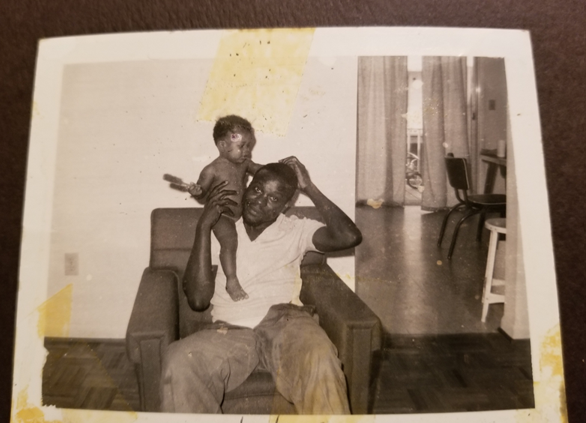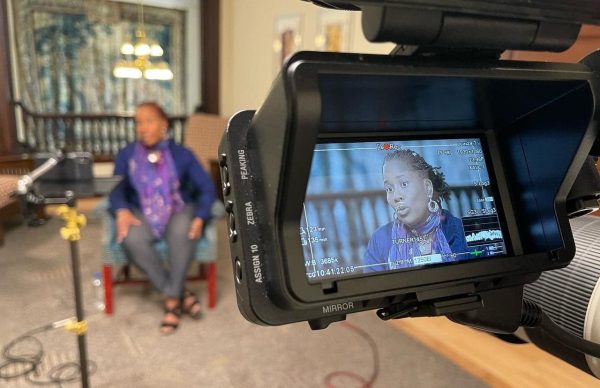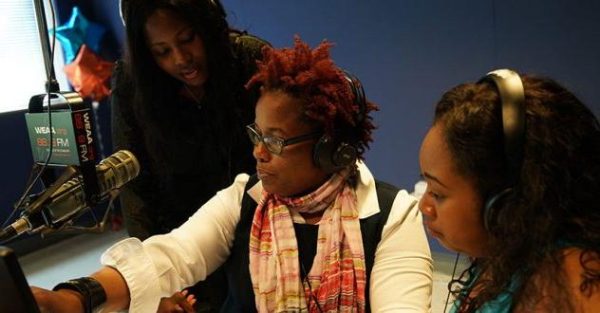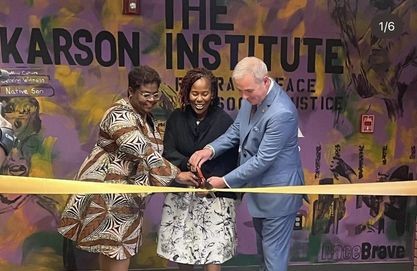She’s a professor of Communication and African American Studies at Loyola University Maryland, a former film documentary director, writer, podcaster, and an activist who has been recognized for all her work centering on topics of race, gender, and identity. Dr. Whitehead is that, and so much more.
Wife and mother of two sons, she was born in South Carolina and grew up between there and Washington D.C. where she went to school. Her father was both a pastor and a civil rights activist, which shaped her into who she is today, and her grandmothers lived in various places: South Carolina, Columbia, and the other in Lexington.
In an interview for The Greyhound, Dr. Whitehead said that her grandmothers were a major influence on her.
“Being around two very strong Black women who taught me often about what it meant to stand up straight in a crooked world, what it means to reclaim my voice, what did it mean to stand up for what I believed in, even if no one else was standing with me,” Dr. Whitehead said.

Following her graduation from the University of Notre Dame with a master’s degree in International Peace Studies and Conflict Resolution, she thought about what it meant to work hard to change the world and use her talents to make the world a better place.
“I have always believed that your life is meant to answer a question that the world has been asking, and that your goal is to spend all that time answering that question,” she said.
It was that belief that drove her to New York City to become a filmmaker. Prior to her moving there, she submitted a “really raw sample film” to the Spike Lee Filmmakers Foundation; she won first place and received a full scholarship to the New York Film Academy where she studied documentary filmmaking. After graduating she got a job working for MTV and worked as an associate producer for several projects before being offered a job as an in-house documentary filmmaker for Metro TV, a PBS-affiliated station, where her role was to “find interesting stories and then tell them.”
Among her documentary film works include a story about a girl going through a brain operation and another about a woman with multiple sclerosis who completed the New York City Marathon, the latter of which she also won a medal for partaking in the marathon while filming. In 2001, she directed a documentary film titled “Twin Towers: A History” where she told the story of the former World Trade Center towers, from their construction, to what they symbolized, and what was lost because of the attacks.
Three days after the attacks, Dr. Whitehead returned to work and went to her producer with the idea of creating the documentary. Less than a week after the attacks, she began to work. Two months later, the film premiered, and still airs every year on PBS stations around the country during the anniversary of the attacks. The film was also Dr. Whitehead’s third Emmy nomination in her documentary filmmaking career.
“I remember thinking that in that moment of tragedy and sorrow, we needed to document what happened for future generations. We had to get our story told and we had to do it before we forgot what was happening,” she said.
Following a period in New York, Dr. Whitehead and her husband moved with their two babies down to Baltimore where she decided to leave television and pursue education. She became a school teacher at Baltimore City Middle School and taught advanced academics and social studies for four years.
“In my third year of teaching, I was the first Baltimore City teacher to win Maryland History Teacher of the Year because of the things I was doing with kids. They were writing books, they were writing plays, they were reconstructing history, they were doing methodology studies, they were asking difficult questions and learning how to answer them,” she said.
It was during that period that Dr. Whitehead received a series of black and white copies of old journals from a friend who was interning at the Pennsylvania Historical Society. The diaries were meant to be trashed but she decided to send them to Dr. Whitehead to see what she thought of them. As she read the three years worth of entries every night, to understand the writing and get into the story, she discovered that they told the story of a Black woman from 1863 to 1865.
“I came across an entry she wrote in August of 1863 where she talked about how she’d gone to church outside of Philadelphia and she said, ‘we was the only Black people in the room’ I remember my jaw dropped at that moment and I just stopped. I was frozen in that moment because I realized that what I was holding was one of the few primary sources written by a free Black woman during the 19th century. It was something that absolutely should not be in a box marked for trash. It should be up on shelves,” she said.
In that moment, Dr. Whitehead realized that she had to decide what direction she was going to go in life and made the decision to get her PhD to work on the diaries. She enrolled in the University of Maryland Baltimore County, UMBC, and the diaries became her dissertation. Later, she would reconstruct the whole narrative and it would become her first book, titled “Notes from a Colored Girl: The Civil War Pocket Diaries of Emilie Frances Davis.” The book went on to win the Darlene Clark Hine Award from the Organization of American Historians and the Letitia Woods Brown Book Award.
“It is an absolutely fascinating story about a young Black woman telling her story, writing in her diary every single day. She wrote about the weather, she wrote about politics, she wrote about hair, she wrote about dating. She really told her story and that her story survived is just incredible, nothing short of a miracle,” she said.
Dr. Whitehead has also written other books, including “Letters to My Black Sons: Raising Boys in a Post-Racial America,” and “RaceBrave: new and selected works,” but she claims that the diaries had “changed her life.”
“The fact that they survived is incredible, but even more important that they ended up in my hand. Black and white copies being sent to me, and I’m reading them, was a moment that changed my life. That’s why I went back to get my PhD, that’s how I got so involved in historical reconstructions, and eventually to where I am now,” she said.

When the Black Lives Matter Movement arrived in 2015, Dr. Whitehead found herself in another turning point in her life where she claimed she realized she needed to do more public intellectual work.
“I cannot hide in the archives. I actually have to get out and make sure that I am interacting with people, that I’m sharing stories and challenging the narrative,” she said.
It was then that she began to do community workshops, travel around the country, and more as part of her activism. But the real accomplishment came when she was offered a daily radio show, where she found a way to work on spreading her message.
“What I realized at that moment was that in taking that step in going into the radio, I was essentially creating the biggest classroom that I could ever have, that people ride in their car all day long. If I’m on the radio during drive time and they’re listening I could begin to shape the way people see themselves, shape the way people think about who we are in this country. I could talk about race, I could talk about class, I could talk about gender, I could talk about identity, all in the space where I’m having a one-on-one conversation with people,” she said.

“Today with Dr. Kaye” made Dr. Whitehead one of few Black women to have a radio show. It went off to win many awards including the Chesapeake Associated Press Award for Outstanding Editorial or Commentary in both 2020 and 2021, the Chesapeake Associated Press Award for Outstanding Talk Show in 2019, and a second place Award for Outstanding Editorial or Commentary.
“I don’t know what the future holds for ‘Today with Dr. Kaye,’ but I will say that it has been thus far one of the greatest joys for me to be on the radio,” she said.
From 2020 to 2023, Dr. Whitehead has also been the President of the National Women’s Studies Association, NWSA, which is the largest academic association for Women and Gender Studies. In her time as president, Dr. Whitehead successfully brought the organization back to in person conferences following their cancellations in 2020 and 2021 due to Covid-19, and released presidential statements about several issues, from challenges to critical race theory to the current issues of the Israel-Hamas War.
“I used that as a platform to be able to be engaged in national and international conversations. We have a database of over fourteen thousand people. So, every time I released a statement it was able to go around the world. People would be able to put it on their websites because they could stand behind the NWSA as a way to talk about these issues without putting themselves in danger,” Dr. Whitehead said.
Dr. Whitehead has also been working at Loyola University Maryland for fourteen years, beginning as an Assistant Professor and teaching elective classes that helped engage in discussions of race, class, and gender. In 2015, she became an Associate Professor before obtaining the official rank of professor in January. Apart from teaching, she also launched The Karson Institute for Race, Peace, and Social Justice after the murder of George Floyd in 2020. In October, The Karson Institute opened its official space at the Loyola Notre Dame Library.

“We were always planning on having a space. We did not know when it was going to happen, but we continued to have activities. We were continuing to be part of the national conversations,” she said.
The Karson Institute made headlines when it hosted William Ruto, Vice President of Kenya, during his visit to the United States. It made it one of two places that the Vice President visited on his journey.
“When we hosted Vice President Ruto, we were trending internationally. Everywhere from China to Korea was talking about Vice President Ruto having these peace talks at The Karson Institute for Race, Peace, and Social Justice,” she said.
Even after all the work she has done, Dr. Whitehead claims that her greatest joy in life was raising her two sons. After watching a fencing match that her youngest son was competing in, it made her reflect on all that she had done.
“I realized that there are so many times on a regular basis that I doubt myself and I doubt what I’m doing. But it was yesterday that I realized that even if I never do anything else, if I never win anything else, if I never accomplish anything else that I have helped to co-raise two brilliant, beautiful, bright, and talented humans, and I have set them loose into the world. They’re going to set the world on fire, and that to me is the greatest gift. It comes from my sons,” she said.
Dr. Whitehead added that everything she did was just a reflection of all the love she has and all the work she has done was to try to leave the world a little bit better then how she found it and that her greatest gift is her sons.
“Their lives are meant to answer questions that the world has been asking,” she said.






































































































